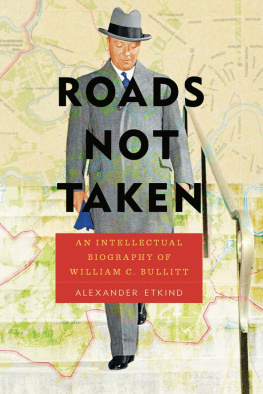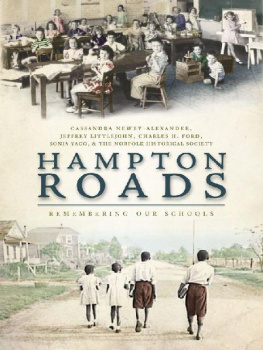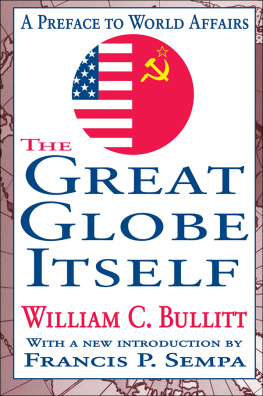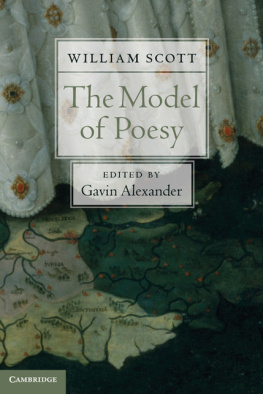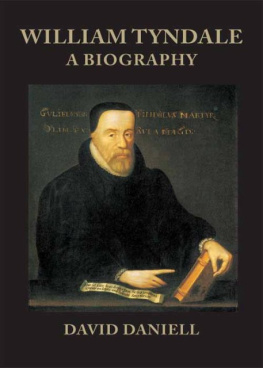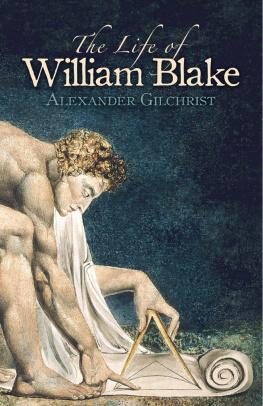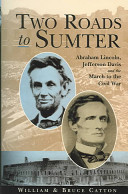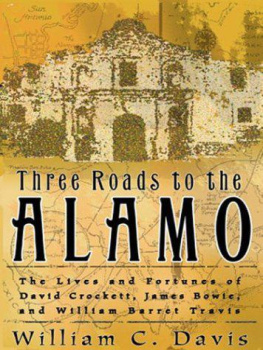Alexander Etkind - Roads Not Taken: An Intellectual Biography of William C. Bullitt
Here you can read online Alexander Etkind - Roads Not Taken: An Intellectual Biography of William C. Bullitt full text of the book (entire story) in english for free. Download pdf and epub, get meaning, cover and reviews about this ebook. year: 2017, publisher: University of Pittsburgh Press, genre: Politics. Description of the work, (preface) as well as reviews are available. Best literature library LitArk.com created for fans of good reading and offers a wide selection of genres:
Romance novel
Science fiction
Adventure
Detective
Science
History
Home and family
Prose
Art
Politics
Computer
Non-fiction
Religion
Business
Children
Humor
Choose a favorite category and find really read worthwhile books. Enjoy immersion in the world of imagination, feel the emotions of the characters or learn something new for yourself, make an fascinating discovery.
- Book:Roads Not Taken: An Intellectual Biography of William C. Bullitt
- Author:
- Publisher:University of Pittsburgh Press
- Genre:
- Year:2017
- Rating:4 / 5
- Favourites:Add to favourites
- Your mark:
- 80
- 1
- 2
- 3
- 4
- 5
Roads Not Taken: An Intellectual Biography of William C. Bullitt: summary, description and annotation
We offer to read an annotation, description, summary or preface (depends on what the author of the book "Roads Not Taken: An Intellectual Biography of William C. Bullitt" wrote himself). If you haven't found the necessary information about the book — write in the comments, we will try to find it.
Roads Not Taken: An Intellectual Biography of William C. Bullitt — read online for free the complete book (whole text) full work
Below is the text of the book, divided by pages. System saving the place of the last page read, allows you to conveniently read the book "Roads Not Taken: An Intellectual Biography of William C. Bullitt" online for free, without having to search again every time where you left off. Put a bookmark, and you can go to the page where you finished reading at any time.
Font size:
Interval:
Bookmark:

PITT SERIES IN RUSSIAN AND EAST EUROPEAN STUDIES
JONATHAN HARRIS, Editor
Published by the University of Pittsburgh Press, Pittsburgh, Pa., 15260
Copyright 2017, University of Pittsburgh Press
All rights reserved
Manufactured in the United States of America
Printed on acid-free paper
10 9 8 7 6 5 4 3 2 1
ISBN 13: 978-0-8229-6503-9
ISBN 10: 0-8229-6503-8
Cover art: William C. Bullitt leaving the White House after a conference with President Roosevelt, January 13, 1939, Harris & Ewing (photographer), Library of Congress Prints and Photographs Division; Moscow General Plan, 1935.
Cover design by Alex Wolfe
ISBN-13: 978-0-8229-8320-0 (electronic)
Yet knowing how way leads on to way,
I doubted if I should ever come back.
ROBERT FROST
Many years ago, my conversations with Paul Roazen contributed to my interest in William C. Bullitt. More recently, Dmitry Bykovs initiative helped to launch this book project. Jay Winters generous guidance at many stages of this work is very much appreciated. Eli Zaretsky and Federico Romero directed me to important sources. Librarians at Yales Sterling Memorial Library helped me to work with Bullitts archive; I am particularly grateful to Dika Goloweiko-Nussberg. In the Freud Museum in Vienna, Daniela Finzi provided the right information at the right time. Vladimir Alexandrov and Laura Downs organized helpful discussions of this project at Yale University and the European University at Florence. Isaac Webb and Linda Kinstler helped me to edit the text. Jay Winter, Julia Fedor, Masha Bratishcheva, Ivan Kurilla, and Tatiana Zaharchenko read the manuscript and gave me invaluable advice, comments, and corrections: I followed many but, sadly, not all of them. Over a memorable dinner, Derk Moses rejected several titles of this book. Eventually Elizabeth R. Moore helped me choose the right title. I am grateful to the European University at Florence for supporting my work on this book.
This is a book about a man who knew how the world worked and how it was changing throughout the twentieth century. He wished to save it and shared his insights with the most powerful people of his time. But they preferred his company to his advice. Usually, his foresights proved to be true when it was already too late to follow them. Time and again, he was on the right side of history.
A journalist, diplomat, and writer, William Christian Bullitt was a member of the American delegation to the Paris Peace Conference (1919), the ambassador to the Soviet Union (19331936) and France (19361940), and the Special Representative of the President of the United States in the Middle East (1940). His political role was significant; it was also controversial. In The Wise Men, a collective biography of several American statesmen who shaped the world of the late twentieth century, Walter Isaacson and Evan Thomas wrote about two men whose careers, as diplomats and political figures, were launched by BullittGeorge Kennan and Charles Bohlen, two world-shapers out of six. Yet, Bullitt spent most of his life as an intellectual rather than as an official. Taking seriously Bullitts words, foresights, and laments, this book addresses Bullitt as an original thinker and elucidates his role as a political actor.
The most cosmopolitan of American politicians of the era, Bullitt spoke several languages, lived in Europe for many years, and eagerly traveled through Asia. A Wilsonian Liberal who gradually became a Cold War Conservative, he was always engaged with the ideas of the Left. He was also a sincere patriot, who believed in the superiority of American values and had no doubt they should proliferate throughout the world. Bullitt adored France, disliked Britain, presciently understood the importance of China, and was deeply compassionate toward Poland. Throughout his life, he was professionally involved in Russian affairs. Always engaged with high politics but rarely invited to contribute to it, he regularly wrote about the missed opportunities that he believed could have made the world a better place. Often arrogant and always impatient he was, surprisingly often, right when so many others were wrong.
Part of the secret to Bullitts foresight was his network. He established personal relationships with some of the twentieth centurys most important people, including Vladimir Lenin, Franklin Roosevelt, Chiang Kai-shek, Charles de Gaulle, Sigmund Freud, and Mikhail Bulgakov. Particularly important was his short friendship and long rivalry with John Reed. In his photos, he is bald, assiduously dressed, and smiling: a personification of American success. But this conventional appearance belied a complex character. Vice-President Henry Wallace described him as an unusually attractive personality and a master of witty conversation; Wallace admired Bullitts knowledge of European sophisticated pleasures and the anecdotal stories... of the many famous people abroad.
During and after the First World War, Bullitt made a name for himself as the pioneering American expert in Russian and European socialism. The leading specialists on the Soviet Union of the next, postSecond World War generation developed under him. Yet, although he did study Russian he never mastered the language, and his knowledge of Russian history and literature, though substantial, always remained amateurish. At the same time, Bullitt had a distinct bias against the British, his brother wrote; Orville Bullitt traced this attitude to impressions made on the brothers in childhood by revelations about British imperialism in Africa and stories of the American Revolution. Bullitt exemplified this proportion, but he was hardly a Russophile. Socialist theories, Soviet practices, and the huge distances between them captured his imagination. In this respect, Bullitts changing attitudes foreshadowed the general disenchantment with communism that came to characterize Western intellectuals much later. A political thinker, Bullitt was puzzled by his tragic century, had original and valuable insights, and tested many ways to implement his ideas.
Early in the twentieth century, Bullitt realized that the collapse of the old regimes in Europe was inevitable, and he became an intense though ambivalent observer of socialist movements. It was a popular sentiment; Leon Trotsky called such people fellow travelers, a moniker that has endured even the collapse of the Soviet Union. It took Bullitt years of personal experience with Russiaan experience that few American fellow travelers hadto become disenchanted with the Soviet God that failed. Ultimately, Bullitts encounter with communism would turn him into a political conservative and a Cold War hawk. A witness to Wilsons idealism and Roosevelts gamble in two world wars, Bullitt wrote that, in politics, wishful thinking was the worst vice. But he did not accept isolationism. In fact, he saw American liberalism and European cosmopolitanism, two great Western legacies, as being deeply connected.
Brilliant and bitter, Bullitt was also mysterious. He did not like compromises:
Bullitt was controversial and inconsistent; the future demonstrated that sometimes he was right and sometimes wrong. It was his focus on the future that was invariable. He read history books and respected historians, but in his own writings and political advice he was interested in the future and not the past. He loved Homers line After the event even the fool is wise. There is no truer saying, he wrote, than the old French aphorism: To govern is to foresee. His eagerness to talk about the future was a part of his peculiar gift, which at times betrayed him. But, untypically for a politician, he was eager to take these risks.
Font size:
Interval:
Bookmark:
Similar books «Roads Not Taken: An Intellectual Biography of William C. Bullitt»
Look at similar books to Roads Not Taken: An Intellectual Biography of William C. Bullitt. We have selected literature similar in name and meaning in the hope of providing readers with more options to find new, interesting, not yet read works.
Discussion, reviews of the book Roads Not Taken: An Intellectual Biography of William C. Bullitt and just readers' own opinions. Leave your comments, write what you think about the work, its meaning or the main characters. Specify what exactly you liked and what you didn't like, and why you think so.

